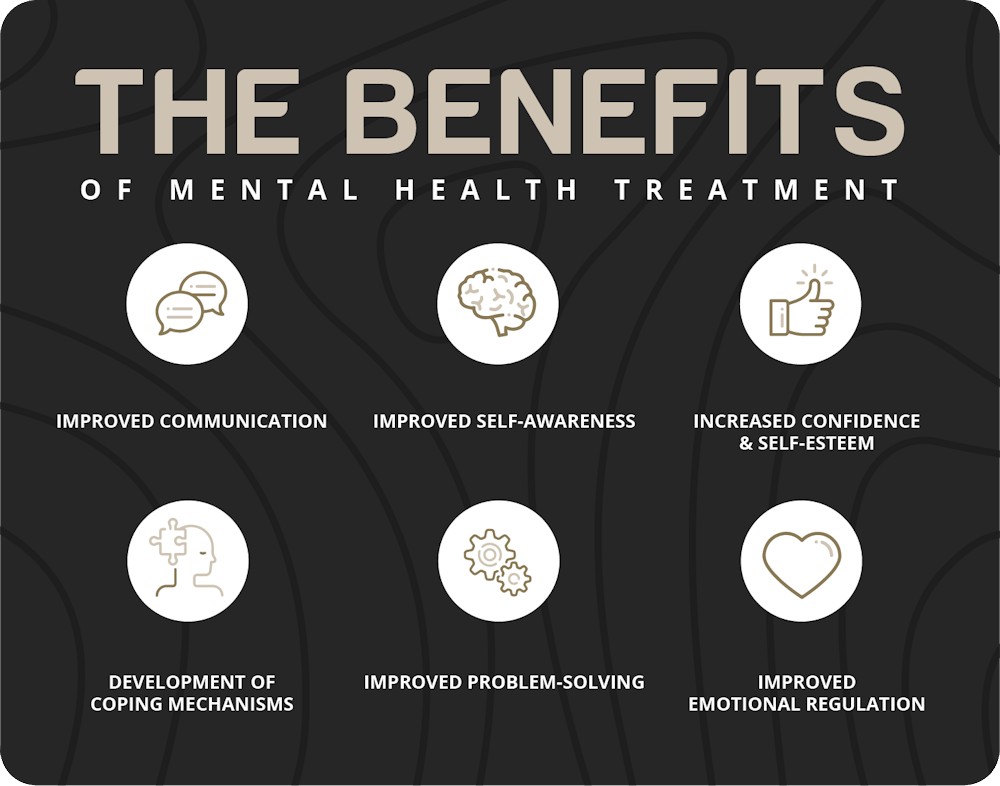The Definitive Guide to Mental Health Counseling
The Definitive Guide to Mental Health Counseling
Blog Article
The Main Principles Of Mental Health Counseling
Table of ContentsHow Mental Health Counseling can Save You Time, Stress, and Money.The 5-Second Trick For Mental Health CounselingMental Health Counseling - The FactsSome Ideas on Mental Health Counseling You Should KnowThe Greatest Guide To Mental Health Counseling
Through treatment, you can get insight into your own patterns of behavior and communication, which can lead to more satisfying and satisfying connections with good friends, family members, and charming partners. What we think, we manifest. If you're consumed with adverse feelings and unfavorable thoughts that are interfering with your life, treatment can help.Like our ideas, in some cases our behaviors come to be destructive. They can maintain us from living a positive and healthy and balanced way of life. Perhaps you battle with addiction, or you tend to self-sabotage, or there are other adverse methods you behave. Mental Health Counseling. Treatment can assist you change those behaviors that are having an adverse effect on your world and relationships.

The relevance of treatment surpasses your mental wellness. Getting treatment to address particular aspects of your life can aid you be much more effective in other locations, consisting of work. Some research study has actually even revealed that there's a direct relationship between looking for psychological health aid and a decrease in missed out on work.

All about Mental Health Counseling
There are even more benefits of therapy than simply the ones we have actually reviewed., or construct partnerships (charming or those with household or close friends) in a healthy and balanced means.
For the function of today research study, perceived benefits and obstacles to psychological health and wellness help-seeking are being explored. Previous research located that regarded barriers have a considerable effect on university student' health and wellness behavior choices (Von Ah, Ebert, Ngamvitroj, Park & Kang, 2003). Regarded advantages and barriers to help-seeking were especially picked due to their influence on decision-making and inevitably activity (Glanz, Rimer, & Su, 2005).
The existing research looks for to analyze whether or not preconception serves as an obstacle to therapy among college trainees. Amongst these were: (1) choosing to deal with mental wellness troubles themselves, (2) not having enough time to participate in treatment, (3) inquiries concerning whether mental health and wellness treatment is efficient in remediating issues, (4) an idea that stress is normal or the problem will get much better without therapy, (5) absence of cash, and (6) stress about what others would believe if they discovered out regarding treatment engagement.
(2006) reported similar variables as barriers to seeking treatment and also found that a skepticism of providers may impede students from seeking help. Staff in campus mental health centers may be perceived as unfriendly, and long wait times for solutions might be "repulsive" for pupils. Variables promoting extra favorable mindsets are usually at the contrary post of those elements determined as barriers.
Mental Health Counseling Fundamentals Explained
One in three (34.6%) reported living on school and one in 4 (23.3%) reported dealing with parents. Nearly half of trainees were associated with campus organizations and 1 in 10 reported remaining in a fraternity or sorority. Even more than one-third of students (38.1%) reported that they had a relative or buddy with an identified psychological wellness problem.

The Only Guide to Mental Health Counseling
Univariate F-tests determined details subscale products that considerably varied. Women were much less most likely than men to view people that go to therapy as emotionally weak, people that go to counseling as insane, to feel that people with mental health issue need to deal with problems on their very own, that people that go to therapy as unable to solve troubles, that people that go to counseling are careless, and to feel that individuals who most likely to counseling are various from typical people in navigate here an unfavorable method.
Research study results exposed that ladies were considerably much less likely than males discover this to hold stigma-related mindsets. This is consistent with previous research study which likewise found that men hold greater levels of perceived preconception than females (Chandra & Minkovitz, 2006). Based upon study searchings for, it is apparent that males might be less most likely than ladies to seek treatment as a result of low regarded barriers as well as high stigma-related attitudes.
Mental Health Counseling Can Be Fun For Anyone
In enhancement, university wellness experts may provide educational programs targeting males with info on the benefits of psychological health therapy and the significance of looking for assistance when required., the present research discovered no significant distinctions in the number of perceived barriers to help-seeking habits based on sex.
Scientist guess that this is largely due to traditional social standards and gender roles that identified view it males based upon strength and lack of psychological expression (Addis & Mahalik, 2003; Ang, Lim, Tan, & Yau, 2004; Mojtabai, 2007). Generally, there have actually been combined outcomes among the university student population pertaining to sex distinctions (Rosenthal & Wilson, 2008). This finding was unanticipated and might highlight that those that had obtained counseling had a far better idea of delay times and other "accessibility" barriers that might make it challenging to start treatment. Maybe, participants that have actually gotten therapy view a lot more barriers than participants that have not gotten therapy because looking for counseling services once more could include fear of self-disclosing personal details to a brand-new counselor.
Report this page